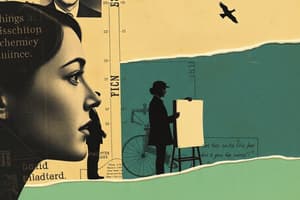Podcast
Questions and Answers
What is the primary focus of central cohesion in learning?
What is the primary focus of central cohesion in learning?
- Integrating individual pieces of information.
- Understanding the situation as a whole. (correct)
- Defining learning milestones.
- Memorizing facts without context.
Which of the following best describes executive function in learning?
Which of the following best describes executive function in learning?
- The process of responding reflexively to stimuli.
- The ability to memorize and recall information.
- The use of social interactions to facilitate learning.
- The ability to plan, organize, and be flexible. (correct)
What does the Theory of Mind entail in the learning context?
What does the Theory of Mind entail in the learning context?
- Understanding reflex actions and their impact.
- Memorizing procedures for problem-solving.
- Developing emotional resilience through experiences.
- Comprehending the thoughts and beliefs of oneself and others. (correct)
Which of the following stages is NOT part of the 3-step view for addressing new learning?
Which of the following stages is NOT part of the 3-step view for addressing new learning?
What is a key goal in the learning process according to interactionist perspectives?
What is a key goal in the learning process according to interactionist perspectives?
Which learning theory emphasizes the role of social interactions in cognition?
Which learning theory emphasizes the role of social interactions in cognition?
Which element in learning refers to the cognitive bias towards local parts instead of the overall context?
Which element in learning refers to the cognitive bias towards local parts instead of the overall context?
What aspect of learning involves sifting through experiences to find solutions?
What aspect of learning involves sifting through experiences to find solutions?
What is the primary reason individuals seek to understand the relationship between causes and effects?
What is the primary reason individuals seek to understand the relationship between causes and effects?
Which type of curiosity decreases as individuals grow older, leading to fewer risks taken?
Which type of curiosity decreases as individuals grow older, leading to fewer risks taken?
According to the principles for facilitating learning proposed by Carl Rogers, which of the following promotes effective learning?
According to the principles for facilitating learning proposed by Carl Rogers, which of the following promotes effective learning?
How do individuals respond to learning opportunities that threaten their self-perception?
How do individuals respond to learning opportunities that threaten their self-perception?
What role does active participation play in the learning process according to the principles outlined?
What role does active participation play in the learning process according to the principles outlined?
What is the ultimate aim of learning as suggested in the content?
What is the ultimate aim of learning as suggested in the content?
Which of the following statements is true about human learning and behavior?
Which of the following statements is true about human learning and behavior?
What is true about learning that incorporates the process of change?
What is true about learning that incorporates the process of change?
What is the first step in Meichenbaum's five steps for teaching self-instructions?
What is the first step in Meichenbaum's five steps for teaching self-instructions?
What role does self-monitoring play in behavioral change?
What role does self-monitoring play in behavioral change?
How does self-reinforcement affect academic performance?
How does self-reinforcement affect academic performance?
What is a strategy for imposing stimulus control to encourage desired behaviors?
What is a strategy for imposing stimulus control to encourage desired behaviors?
Which process is not involved in the cognitive side of self-regulation?
Which process is not involved in the cognitive side of self-regulation?
What is self-efficacy primarily related to?
What is self-efficacy primarily related to?
What technique can enhance self-monitoring according to the content?
What technique can enhance self-monitoring according to the content?
Which of the following is a component of self-regulated learning?
Which of the following is a component of self-regulated learning?
What role do cognitive factors play in the learning process?
What role do cognitive factors play in the learning process?
Which of the following summarizes a key concept of social learning theory?
Which of the following summarizes a key concept of social learning theory?
What is a key characteristic of generalized imitation according to Miller and Dollard?
What is a key characteristic of generalized imitation according to Miller and Dollard?
How does self-reinforcement function in the context of imitation?
How does self-reinforcement function in the context of imitation?
What is an example of reinforcement by a model in learning?
What is an example of reinforcement by a model in learning?
Which of the following statements reflects a misconception of social cognitive theory?
Which of the following statements reflects a misconception of social cognitive theory?
Which factor is crucial for understanding learning in social contexts?
Which factor is crucial for understanding learning in social contexts?
What did cultural examples, such as Beatles-inspired haircuts, illustrate in terms of learning?
What did cultural examples, such as Beatles-inspired haircuts, illustrate in terms of learning?
What is the term used to describe the interaction between behavior, personal factors, and environmental conditions?
What is the term used to describe the interaction between behavior, personal factors, and environmental conditions?
Which process is NOT a cognitive factor in social learning theory?
Which process is NOT a cognitive factor in social learning theory?
What role do mirror neurons play in modeling behavior according to social learning theory?
What role do mirror neurons play in modeling behavior according to social learning theory?
How does vicarious reinforcement primarily contribute to learning?
How does vicarious reinforcement primarily contribute to learning?
What is the primary effect of observing a model who faces no consequences for misbehavior?
What is the primary effect of observing a model who faces no consequences for misbehavior?
According to Bandura, what is a key aspect of modeling?
According to Bandura, what is a key aspect of modeling?
Which of the following NOT an effect of reinforcement to the model?
Which of the following NOT an effect of reinforcement to the model?
What are the observable actions and reactions of an individual referred to in reciprocal causation?
What are the observable actions and reactions of an individual referred to in reciprocal causation?
What primarily motivates people regarding their goals?
What primarily motivates people regarding their goals?
Which emotion is NOT considered a self-conscious emotion?
Which emotion is NOT considered a self-conscious emotion?
How does boredom affect learning?
How does boredom affect learning?
What is the impact of positive emotions on learning?
What is the impact of positive emotions on learning?
What does cognitive dissonance motivate a person to do?
What does cognitive dissonance motivate a person to do?
What distinguishes state anxiety from trait anxiety?
What distinguishes state anxiety from trait anxiety?
Which of the following statements about anxiety is true?
Which of the following statements about anxiety is true?
What role do emotions play in how we remember information?
What role do emotions play in how we remember information?
Flashcards
Epistemic Curiosity
Epistemic Curiosity
A natural drive to understand the cause-and-effect relationships in our environment, helping us adapt and make better decisions in everyday life.
Perceptual Curiosity
Perceptual Curiosity
A feeling triggered by encountering something surprising, puzzling, or conflicting with our existing knowledge.
Perceptual Curiosity Decline
Perceptual Curiosity Decline
Curiosity that decreases as we grow older, leading to taking fewer risks or challenges.
Incidental Learning
Incidental Learning
Signup and view all the flashcards
Threat to Self-Perception in Learning
Threat to Self-Perception in Learning
Signup and view all the flashcards
Minimizing External Threats in Learning
Minimizing External Threats in Learning
Signup and view all the flashcards
Rogers' Principles of Facilitating Learning
Rogers' Principles of Facilitating Learning
Signup and view all the flashcards
Lifelong Learning & Metacognition
Lifelong Learning & Metacognition
Signup and view all the flashcards
Observational Learning
Observational Learning
Signup and view all the flashcards
Personal Agency
Personal Agency
Signup and view all the flashcards
Reciprocal Causation
Reciprocal Causation
Signup and view all the flashcards
Generalized Imitation
Generalized Imitation
Signup and view all the flashcards
Reinforcement By the Model
Reinforcement By the Model
Signup and view all the flashcards
Reinforcement By a Third Person
Reinforcement By a Third Person
Signup and view all the flashcards
Self-Reinforcement
Self-Reinforcement
Signup and view all the flashcards
Operant Conditioning and Imitation
Operant Conditioning and Imitation
Signup and view all the flashcards
Behaviorism
Behaviorism
Signup and view all the flashcards
Cognitive Perspective
Cognitive Perspective
Signup and view all the flashcards
Thorndike's Connectivism
Thorndike's Connectivism
Signup and view all the flashcards
Pavlov's Classical Conditioning
Pavlov's Classical Conditioning
Signup and view all the flashcards
Skinner's Operant Conditioning
Skinner's Operant Conditioning
Signup and view all the flashcards
Bandura's Social Cognitive Theory
Bandura's Social Cognitive Theory
Signup and view all the flashcards
Vygotsky's Socio-historical Theory
Vygotsky's Socio-historical Theory
Signup and view all the flashcards
Piaget's Genetic Epistemology
Piaget's Genetic Epistemology
Signup and view all the flashcards
Meichenbaum's Five Steps for Self-Instruction
Meichenbaum's Five Steps for Self-Instruction
Signup and view all the flashcards
Self-Monitoring
Self-Monitoring
Signup and view all the flashcards
Self-Imposed Stimulus Control
Self-Imposed Stimulus Control
Signup and view all the flashcards
Self-Regulated Learning
Self-Regulated Learning
Signup and view all the flashcards
Self-Efficacy
Self-Efficacy
Signup and view all the flashcards
Social Learning & Modeling
Social Learning & Modeling
Signup and view all the flashcards
Cognitive Factors in Social Learning
Cognitive Factors in Social Learning
Signup and view all the flashcards
Modeling
Modeling
Signup and view all the flashcards
Vicarious Reinforcement
Vicarious Reinforcement
Signup and view all the flashcards
Vicarious Punishment
Vicarious Punishment
Signup and view all the flashcards
Biological Predisposition to Imitate
Biological Predisposition to Imitate
Signup and view all the flashcards
Balance in Learning Environments
Balance in Learning Environments
Signup and view all the flashcards
Emotional Motivation
Emotional Motivation
Signup and view all the flashcards
Self-Conscious Emotions
Self-Conscious Emotions
Signup and view all the flashcards
Boredom and Engagement
Boredom and Engagement
Signup and view all the flashcards
Pleasant vs. Unpleasant Emotions
Pleasant vs. Unpleasant Emotions
Signup and view all the flashcards
Cognitive Engagement and Mood
Cognitive Engagement and Mood
Signup and view all the flashcards
Cognitive Dissonance
Cognitive Dissonance
Signup and view all the flashcards
Affect and Cognition
Affect and Cognition
Signup and view all the flashcards
Hot Cognition
Hot Cognition
Signup and view all the flashcards
Study Notes
Learning Theories
- Learning is a process of change in behaviour or the potential to behave in a specific way through experience.
- Learning is a relatively permanent change in behaviour or the capacity to behave due to experience,
- Learning is the key to survival.
Learning in Humans
- Human learning is distinguished from other animals.
- Humans are born into a culture that conserves and transmits past learnings.
- In comparison, other species start their learning afresh each generation.
Psychological Definition of Learning
- Psychologists often define learning as a relatively permanent change in behavior as a result of experience.
Characteristics of Learning
- Learning is a process that is not always obvious unless there is a difficulty.
- Learning plays a vital role in the development of individuals as well as the development of society.
- Learning and taking risks are intrinsic to being human, it can be satisfying even if one fails.
Curiosity
-
Innate need to understand and discover the world. This is something that has existed for many generations.
-
Our ancestors' behaviours show inherent curiosity – exploring, experimenting procreating etc.
Studying That Suits You
Use AI to generate personalized quizzes and flashcards to suit your learning preferences.




